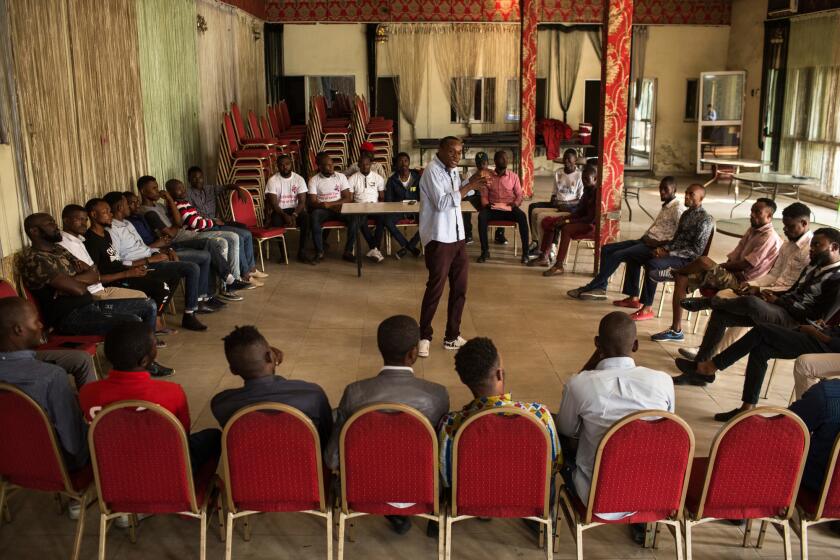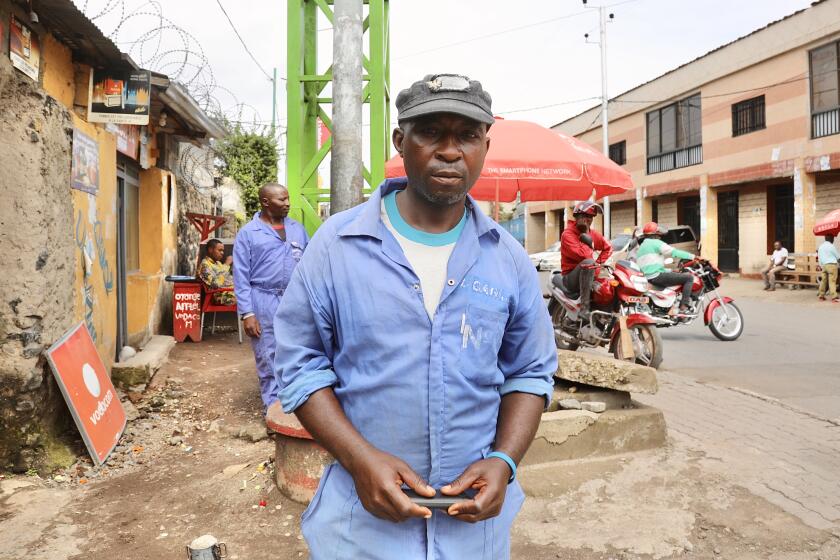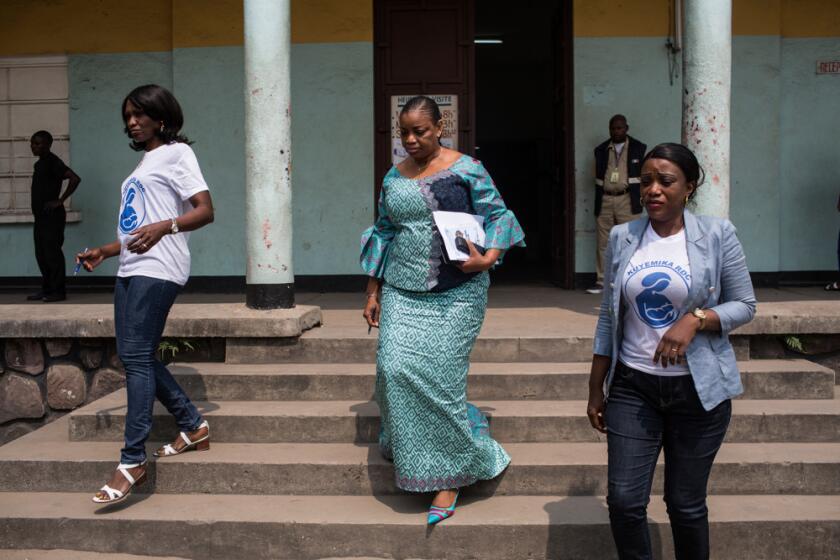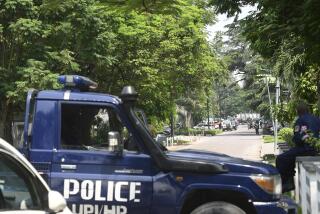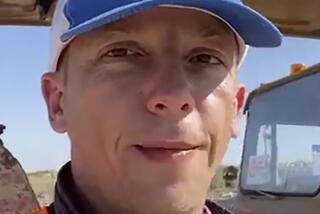Italian ambassador, 2 others killed in attack in Congo
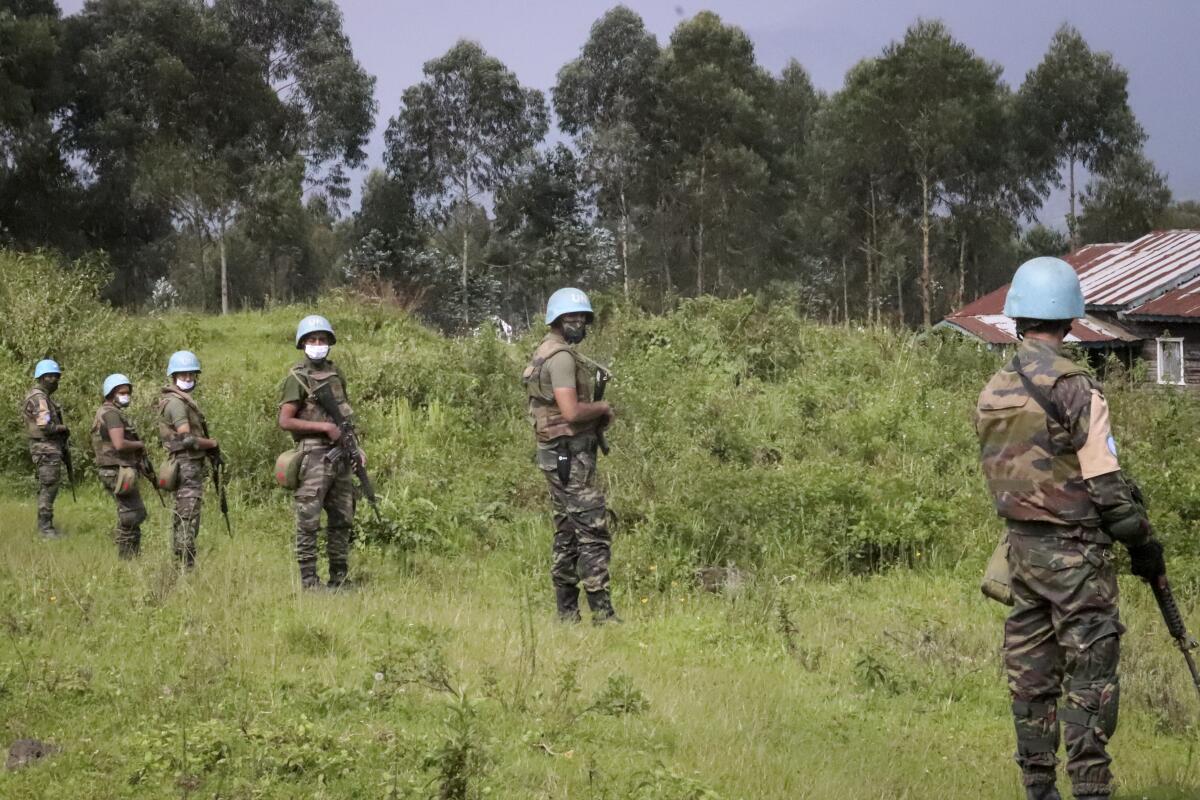
- Share via
KINSHASA, Congo — The Italian ambassador to Congo, an Italian Carabinieri police officer and their Congolese driver were killed Monday when gunmen attacked a U.N. convoy traveling to a school in eastern Congo, the Italian Foreign Ministry and residents said.
Luca Attanasio, serving at the Italian Embassy in the country since 2017, Carabinieri officer Vittorio Iacovacci and their driver Moustapha Milambo were killed, officials said. Other members of the convoy were wounded and taken to a hospital, the World Food Program said.
Congo’s Interior Ministry said four others in the convoy were kidnapped, but one person has since been found by Congo’s army.
The ambush occurred as the convoy was traveling from Goma, Congo’s eastern regional capital, to visit a World Food Program school project in Rutshuru, the U.N. agency said.
When Alain Mulumba Kabeya was considering joining the pro-democracy movement three years ago, a friend who recruited him had a question: “Are you ready to die for others?”
The World Food Program said the attack occurred on a road that had been cleared previously for travel without security escorts, and it was seeking more information from local officials on the attack. Eastern Congo is home to myriad rebel groups all vying for control of the mineral-rich Central African nation that is the size of Western Europe.
The attack, about 15 miles north of Goma, was right next to Virunga National Park. North Kivu Gov. Carly Nzanzu Kasivita said the U.N. vehicles were hijacked by the attackers and taken into the bush. The Congolese army and park guards for Virunga National Park came to help those who had been attacked, he said.
“There was an exchange of fire. The attackers fired at the bodyguard and the ambassador,” the governor said.
Attanasio was shot in the abdomen, according to a statement by Congo’s Interior Ministry. He was then transported to the U.N. Mission in Congo hospital where he died from his wounds, the ministry said.
Without citing sources, Italian state TV on Monday night said the convoy apparently was the target of a kidnapping attempt with the aim of securing ransom money.
This city in central Africa has few doctors or ventilators. But it may be better prepared than many other places for coronavirus.
Attanasio, a 43-year-old career diplomat, left behind a wife and three young children.
The attack occurred in the same area where two Britons were kidnapped by unidentified gunmen in 2018, said Mambo Kaway, head of a local civil society group.
“The situation is very tense,” he added.
There was no immediate claim of responsibility for the attack.
Congo’s Interior Ministry has blamed the Democratic Forces for the Liberation of Rwanda, the Rwandan Hutu rebel group known as FDLR, for the attack.
The interior ministry said the provincial authorities of North Kivu were not aware of the presence of the Italian ambassador, which did not allow them to provide him with security measures.
Congo’s president, Felix Tshisekedi, gave his sincere condolences to the families of the victims and has called for an investigation so that the perpetrators can be brought to justice, according to the president’s office.
More than 2,000 civilians were killed last year in eastern Congo in violence by armed groups whose brutal attacks have also displaced more than 5.2 million people in what the U.N. calls one of the world’s worst humanitarian crises.
Breaking News
Get breaking news, investigations, analysis and more signature journalism from the Los Angeles Times in your inbox.
You may occasionally receive promotional content from the Los Angeles Times.
Marie Tumba Nzeza, Congo’s minister of foreign affairs, sent her condolences and promised the Italian government that the Congolese government would do all it could to find those behind the killings.
Italian President Sergio Mattarella and Premier Mario Draghi also expressed their condolences to the victims’ families. Flags at Italian government buildings were ordered to fly at half-staff Monday and Tuesday.
“The circumstances of this brutal attack are still unclear and no effort will be spared to shed light on what happened,” Foreign Minister Luigi Di Maio said.
Di Maio hurried back from a European Union ministerial meeting in Brussels to Rome to discuss the attack with Draghi.
The Rome prosecutors office investigates crimes abroad against Italians. A specialized Carabinieri unit was expected to arrive Tuesday in Kinshasha to help in the Italian investigation.
After diplomatic posts in Switzerland, Morocco and Nigeria, Attanasio was assigned to the Embassy in Kinshasa in September 2017.
Last October, he was awarded the Nassiriya International Prize for Peace in a ceremony held in a church in southern Italy. Attanasio was cited for “having contributed to the realization of important humanitarian projects, distinguishing himself for altruism, dedication and the spirit of service for people in difficulty,” La Repubblica newspaper reported.
It quoted Attanasio as saying that “all that which we take for granted in Italy isn’t in Congo, where, unfortunately, there are so many problems to resolve.”
Attanasio described the role of the ambassador as “above all to be close to the Italians, but also to contribute to achieving peace.” About 1,000 Italians live in Congo.
Congo suffered through one of the world’s most brutal colonial reigns before undergoing decades of corrupt dictatorship. Back-to-back civil wars later drew in a number of neighboring countries. In January 2019, Congo experienced its first peaceful democratic transfer of power since independence in 1960 following the election of President Felix Tshisekedi.
The U.N. peacekeeping mission has been working toward drawing down its more than 17,000-troop presence in the country and transferring its security work to Congolese authorities.
“These tragic killings highlight the insecurity in eastern Congo,” in an area that has seen a rise in kidnappings, organized criminality and militias, said Ben Shepherd, consulting fellow with the Chatham House Africa Program.
It took place on one of the main roads from Goma, a well-traveled road that is generally viewed as secure, he said, adding that it would be difficult to know at this point if it was a random, opportunistic attack on a convoy or a planned attack.
U.N. peacekeeping chief Jean-Pierre Lacroix said during a previously planned news conference Monday that the determination of whether roads are safe is normally made by U.N. security officials in the country. He said he had no details on “the exact unfolding of the incident.”
“The investigation will bring, hopefully, clarity to that,″ Lacroix added.
More to Read
Sign up for Essential California
The most important California stories and recommendations in your inbox every morning.
You may occasionally receive promotional content from the Los Angeles Times.
